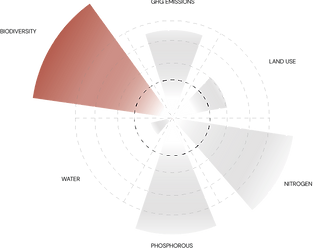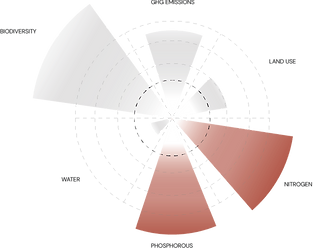In 2040, 9 out of 10 meals are within planetary boundaries
In 2040, 9 out of 10 meals are within planetary boundaries.

Priority compass
Planetary boundaries & current system impact
With 7 out of 9 planetary boundaries exceeded, and the world heading towards a 3 degree future by the end of this century, we should now follow the "fireman’s law" approach, used in forest management. The approach suggests that we first should prevent further damage, then protect what we can, and finally address the remaining issues. However, despite recognizing the urgency, and having knowledge of transition routes, we struggle to unite and address these issues effectively.



Climate change Agriculture is a major source of Sweden’s greenhouse gas emissions, particularly methane from livestock and nitrous oxide from fertilizers. Imported feed, such as soy, also contributes to deforestation and carbon emissions abroad. While Sweden aims to reduce emissions through sustainable practices, food production still has a significant carbon footprint.
Biodiversity loss Intensive farming, monocultures, and pesticide use reduce habitats for pollinators, birds, and other wildlife. The expansion of farmland, both domestically and through imported feed, contributes to habitat destruction and species decline. Sweden has strong conservation efforts, but agricultural practices still put pressure on biodiversity.
Land-use change The conversion of forests and grasslands into farmland, both within Sweden and abroad (due to imported products), disrupts ecosystems and carbon storage. While Sweden has strict land-use regulations, reliance on imported food and feed crops links its food system to land degradation elsewhere.

Freshwater use Although Sweden has relatively abundant freshwater resources, agricultural irrigation and feed crop production put pressure on local water supplies. Additionally, imported food products, such as fruits and grains, contribute to water scarcity in other countries where they are grown.

Biogeochemical flows The overuse of fertilizers and manure in Swedish agriculture leads to nutrient runoff into lakes and the sea, causing eutrophication and dead zones. This disrupts marine ecosystems and threatens fisheries. Policies have reduced nutrient leakage, but the problem persists, particularly in southern Sweden.
About the platform
The 9outof10 Innovation Platform seeks new approaches to adress the challenges of shifting towards sustainable, healthy, accessible, well-tasting and affordable diets for everyone. Mission of 9 out of 10 meals consumed in Sweden are within the planetary boundaries related to food by 2040.



